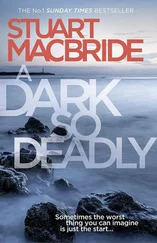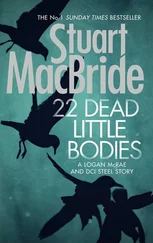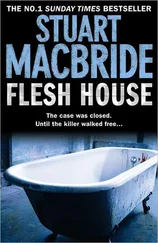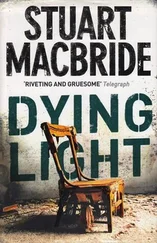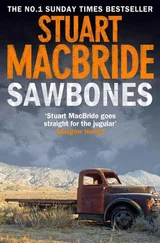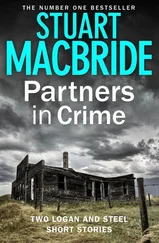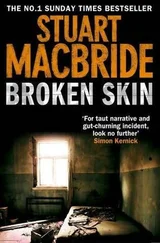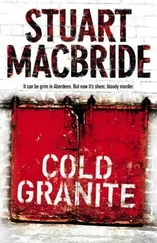‘See anything you fancy?’
‘I…em…’ He could feel his cheeks flush. ‘Er…whatever you’re having.’
Jo smiled, and Will couldn’t help smiling back. Even if he did feel like an idiot.
She punched their order into the tabletop. ‘What did you do to Brian last night? He’s done nothing but eat pickled onion crisps and swig coffee all day.’
‘Ah, the Agent Alexander patented hangover remedy. We got a bit hammered last night; kind of drowning our frustrations.’ He fiddled with the tomato sauce. ‘Director SmithHamilton’s banned all return visits to Sherman House until things calm down over there.’
‘So we can’t go anywhere with the Allan Brown investigation.’ She scrunched her face up. ‘Arse…’
‘Sorry, Jo.’
‘Damn it. I thought this time we’d actually be in with a decent chance of proving something.’ She sat back in her seat and sighed. ‘Like I said, it’s pretty clear one of the Road-hugger crew did it, but still…Be nice to get closure for a change. How long’s it off-limits for?’
‘No idea. The whole square’s under quarantine till further notice.’
The starters arrived-two bowls of Cullen Skink-and they ate their soup in silence. Slowly the mood began to lighten. They talked about old cases, movies, made fun of the sour-faced passers-by scuttling between the puddles. The main course was barely on the table before Jo sat bolt upright in her seat, her left eye going from golden brown to milky grey. ‘Sod it…’ She dug a bright-red fingerphone from her jacket pocket and slipped it on. Pointed it at herself.
‘DS Cameron, go ahead.’
Will paused, fork halfway between a bowl of ruby-coloured goulash and his mouth.
‘Negative.’ She pushed her plate away. ‘I’ll be at the station-house in about thirty seconds. Fire up a Hopper, we’ll meet them there.’
Jo stuck the fingerphone back in her pocket and stood. Will followed her. ‘What’s up?’
‘Got a match on the Kilgour prints.’ She dragged her green and orange jacket back on. ‘Pickup team are waiting for me.’
‘I’ll come with you.’
‘Oh no you don’t: you’re confined to barracks, remember?’
‘But-’
‘No buts.’ She pushed him gently back into his seat. ‘Stay. Eat your dessert. I’ll let you know how we get on.’
Then she was gone, running out of the door and into the pounding rain. Will watched until her brightly coloured suit was swallowed up by the drenched crowd. A minute later the café’s windows rattled and the roar of a Hopper’s engines cut through the lunchtime rush.
Slowly he sank back into his seat and looked down at the plate of clotting, dark-red lumps. He just wasn’t hungry any more.
The hospital’s hum has become as familiar to her as her own breathing, warm and reassuring. She sits in her cosy nest of toilet paper, with a datapad on her lap, doing a little light reading. Her personal research notes have always been part of the PsychTech files, hidden away amongst the endless records of bed-wetting, insomnia, shoplifting, father-hatred, mother-love, sibling-rivalry, and all the other mental debris of the people she and her team interviewed.
But her files aren’t like the other PsychTech files: her files are secret, hidden away in an obscure subdirectory. Password protected, and encrypted.
PsychTech. She headed up the project for five happy years, monitoring a cross-section of Glasgow’s most vulnerable citizens, making sure they didn’t become a danger to themselves or others. Of course it was all her idea. She campaigned for it, pushed it through committee, dazzled them with her dedication and brilliance. Made them see that if you knew what the criminal mind looked like, you could start going through the population, picking out people who fitted the profile. People who might not have done anything wrong yet , but had all the right screws loose to do so in the future.
And who knew more about the criminal mind than her?
So she rose up through the ranks, her budget and remit snowballing as she climbed. It was a Ministry for Change flagship project-a vast psychological experiment designed to make Glasgow a better, safer place.
She wriggles deeper into her nest.
They didn’t have a clue about her own special project: Harbinger.
Her fingers stroke the datapad, opening the secret research notes…Opening…She stops. Frowns at the screen. There’s something not right, something that tugs at the holes in her memory.
Something…
Never mind, it’ll come to her in time.
Dr Westfield works her way through the case notes, following her children’s progress from the first time she saw their parents. There’s a lot to read through; some of them weren’t even born when she started to mould their psychological development. When the Ministry shut down the PsychTech programme they cut off her children. No therapy, no analysis, no one listening to their problems and twisted little fantasies. Six years without her guidance and advice.
Such a waste.
There are twenty-seven of them: boys, girls, and some not quite certain what they are. The girls are the most challenging to work with: they don’t mould as well as the boys do, female killers being more suited to the spree than the serial. The uncertain ones were the easiest; sexual dysfunction is a wonderfully fertile playground for the seasoned psychologist.
Gently she taps the datapad against her exposed teeth. Six year is a long time. Who knows what mischief they’ve been getting up to.
Twenty-seven opportunities for beautiful carnage. Twenty-six of them still out there, primed and ready to explode.
At the trial they’d thought Alastair Middleton was the only killer she’d created. Poor Alastair: her first real success. Just a shame he hadn’t been a bit more careful in his choice of prey. If he had she wouldn’t be sitting here with half her face missing.
This is his fault: if it wasn’t for him she’d have a seat on the Ministry board by now. All because that stupid shit couldn’t keep his fucking dick in his trousers. Filling her world with broken glass, turning her into a mutilated freak. ALL HIS BLOODY FAULT.
She pulls another ampoule of medicine from the pack and snaps it into her neck with trembling fingers. Calm. Calm. Deep breaths.
It’s no one’s fault. It’s no one’s fault.
The chemicals rush through her bloodstream. Alastair was only doing what she’d taught him to do.
Calm.
It was bad luck, nothing more.
Calm.
Her eyes drift back to the datapad in her hands.
Six years. Most of her children would be in their late teens or early twenties by now. Perhaps Alastair Middleton wasn’t the only one who’d achieved his potential. Perhaps his wouldn’t be the only halfheading she’d find in the Glasgow Royal Infirmary database. Dr Westfield punches her children’s names into the hospital search engine and settles back to wait.
The results, when they come back, are encouraging.
Three have suffered minor breaks-nothing serious, just arms and legs. Four are getting treatment for psychotic disorders and she spends a happy hour or two reading through the psychiatrists’ notes. Of course the questioning isn’t anywhere near as insightful as her own would have been, but then she has a unique perspective.
Five of her children are already dead: two stabbings, one shot during a ‘Police Action’, one suicide, and one cut up so badly in a public toilet that they needed a DNA match to identify him. Details on the two stabbings are slim, little more than post mortems, but the shooting victim is a lot more interesting. Duncan Clark, multiple Thrummer wounds to the face and head. His post-mortem holos are a 3D treat in vivid red and purple; his head looks as if it’s been skinned then sandblasted. She calls up the NewsNet, runs a search for ‘DUNCAN CLARK’.
Читать дальше

